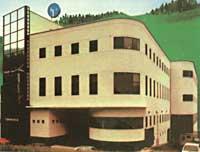Tekniker, Basque research association in the IMS programme
1993/03/01 Elhuyar Zientzia Iturria: Elhuyar aldizkaria
In recent years a new, high-level concept of productive automation has emerged known as IMS (Intelligent Manufacturing Systems). This new concept of production technologies affects all areas and business areas, from supplier control to product support in the market.
Unlike the CIM approach, in IMS the structuring parts of each business activity are able to create a high-level unit as intelligent, as owner, integrable and as a whole. IMS reinforces the role of man. Not as a mere element of the complex productive system, but as a source of creativity.
The idea of IMS was born in Japan in 1990, under the auspices of the MITI, Japanese Minister of Industry and International Trade, with a budget of one billion dollars for 10 years and with the promulgation of several international research programs. After contacting the US, EC, EFTA, Australia and other institutions of the same purpose and competence in Canada, the three IMS Governing Committees for the Coordination, Technique and Protection of Property Rights were established.
After completing the global structure, it was decided to conduct a series of one-year project trials as the first step of the program, in which the definitive feasibility of the IMS idea will be analyzed at the planetary level.
With this objective a call for proposals was opened, the XIII European Congress of Information Technology and Telecommunications. Managed by the Directorate General. Once the applications were received and the evaluation was completed, the IMS program decided to carry out 6 projects of different approaches:
- Clean Manufacturing (ICI)
- Global Concurrent Engineering (Northern Telecom)
- Enterprise Integration (British Aerospace/Toyo Eng)
- Holonic Manufacturing Systems (Allen Bradley/Hitachi)
- Rapid Product Development (UTC/Daimler Benz)
- Knowledge Systematization (Mitsubishi)
Alta, the proposal “Holonic Manufacturing Systems”, led by Allen Bradley (USA) and Hitachi (Japan), counts among its European partners with the Basque research association Tekniker.
The “holonic” vision of the factory of the future fully responds to the idea of IMS to give the company a greater hobby, starting from the integration of its productive means into intelligent units, “holons”, owners, flexible and collaborators.
Within this global project, Tekniker will participate in the tasks related to the design of holonic control systems, selection of tests for these systems, proposal of holonic control standards and technological transfer of results. The commitment envisages an approximate dedication of 2 years in a project involving 32 companies and organizations from around the world industrialized, with a total budget of 44 years and a budget of more than 700 million pesetas.
The structure of the consortium is as follows:
USA Bradley/
RockwellBoston University Carnegie
Mcllon University
of UTCCalgary/BerkelyConneticut University
EUROPASofingAITECFhG-IPAIFW/Catholic
University
of Leuven
JAPONIAHitachiFanucHitachi University
of
SeikoCoke University
ToshibaYaskawa
KANADAQueens University
Alberta Research Council
Basic Technologies Calgary
Australia

Gai honi buruzko eduki gehiago
Elhuyarrek garatutako teknologia





